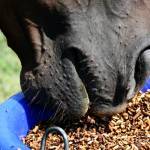Taste Preferences: Why Your Horse May Be a Picky Eater

Is your horse a frustratingly picky eater? According to a recent study, horses have incredibly specific nutritional inclinations and needs, which translates into distinct taste preferences.
“Left to their own devices, grazing horses would consume a wide range of plants while avoiding unpalatable, indigestible, or poisonous ones,” explained Kathleen Crandell, Ph.D., a Kentucky Equine Research nutritionist. “Horses rely on texture and smell, in addition to taste, to choose feeds, and an evaluation of all three senses would provide further information regarding those feeds horses prefer.”
Because the forages that horses were exposed to during evolution vary dramatically based on geography, one might suspect that taste preferences among different breeds may differ. To test this theory, one group of veterinary researchers* recruited 48 horses of different breeds, both mares and stallions. The horses were offered a variety of feeds and treats in separate buckets over a period of three days. The sequence of feed consumption and the time taken to ingest the feed were recorded.
Results of this study indicated:
- Breed and sex influence feed consumption;
- Feeds containing molasses were more willingly consumed by mares;
- All breeds strongly preferred treats with apples and carrots; and
- Pellets were the least preferred in this study group.
Of particular note, according to the researchers, taste preference should not be judged by which feed a horse eats first because sometimes those were consumed more slowly. In other words, they were saving the best for last.
“This is important work, because palatability can be a significant hurdle when considering horses with a chronic medical condition or those recovering from surgery or illness. Consultation with a Kentucky Equine Research nutrition advisor could help identify palatable feeds that best support your horse’s nutrition needs, both in the short and long term,” advised Crandell.
For example, a nutrition advisor can recommend alternatives to molasses-based products that may be inappropriate for horses with insulin dysregulation or equine metabolic syndrome.
With patience, most owners of picky horses will hit upon a diet that pleases the palate and supplies the nutritional components necessary for optimal health.
*Janczarek, I., I. Wilk, S. Pietrzak, et al. 2018. Taste preferences of horses in relation to their breed and sex. Journal of Equine Veterinary Science. 64:59-64.








